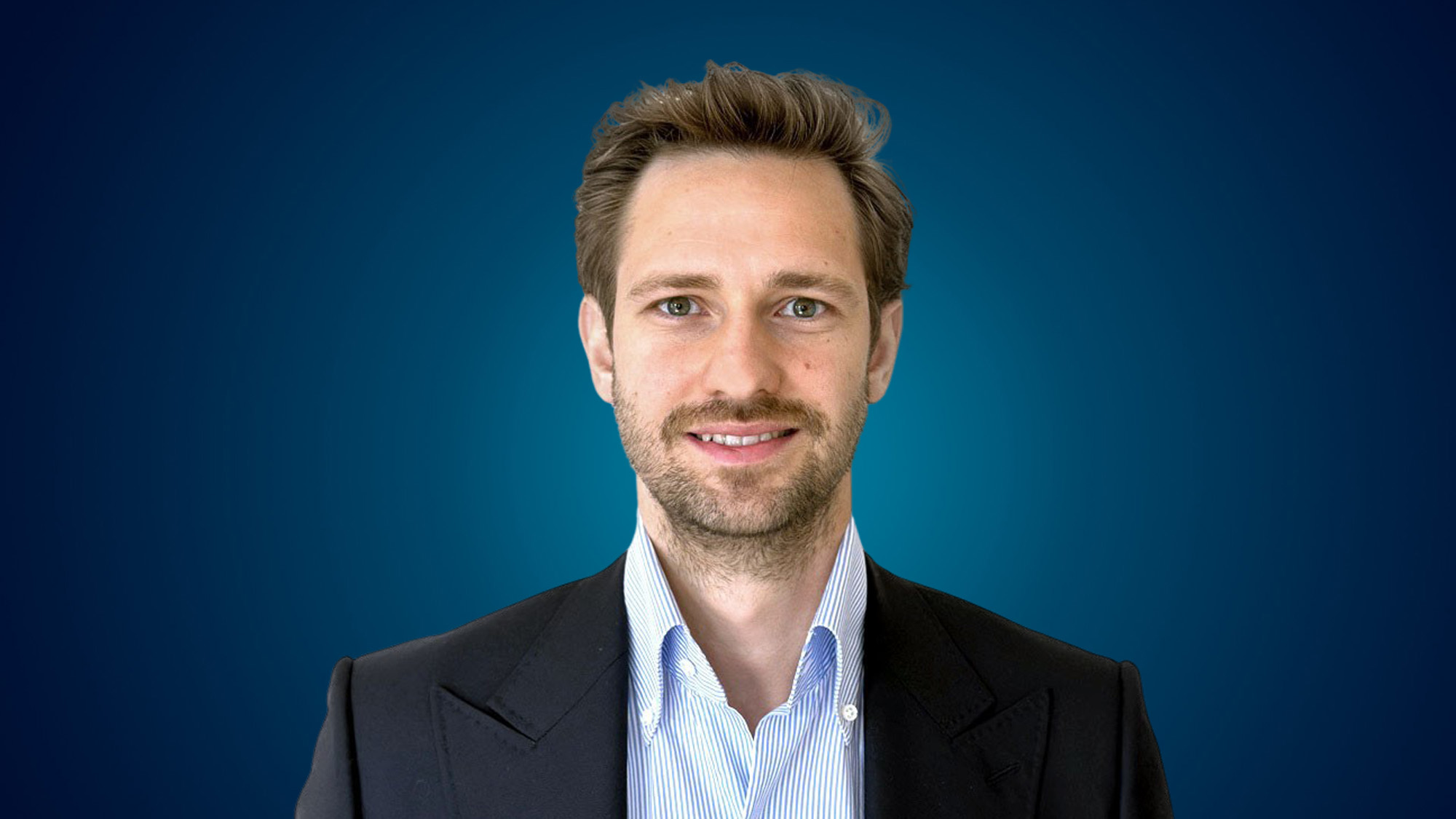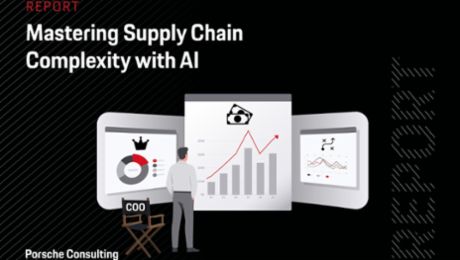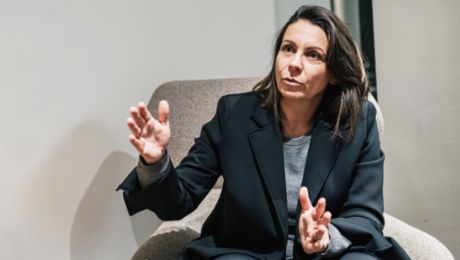Dr. Teresa Schlichting is an open-minded, cheerful doer without a trace of attitude or insignias of power. Someone who instantly, naturally, and sincerely generates a team spirit and a positive working atmosphere. She needs both. She and her colleagues on the board are in the midst of a major task that requires them to convince and integrate many individuals. Executives and employees alike need to pull together and put a strategic transformation into practice.
If you ask this top manager which of her company’s many locations is its main office, she will reply that “we don’t have a center of gravity.” She rejects headquarters and boardrooms, preferring a flexible approach that prompts her to find a desk wherever she is needed. Naturalness and the ability to relate to people are far more important to her than authority in the sense of holding an office. Teresa Schlichting has a doctorate in economics and became Riverty’s Chief Strategy Officer in 2021. Her vision is also a precisely defined long-term goal of turning the company into a “people-centered fintech” enterprise. She and her team want to shape the company such that “people are passionate about it” — and by people she means its employees as much as its customers.
.png/jcr:content/PCO_20230302_053175_MarcoProsch_16.png)
At Riverty the next challenge consists of filling this newly created name with content and raising its profile. Until the fall of 2022 the company was known as Arvato Financial Solutions — a subsidiary of the Bertelsmann international media corporation founded in 1835 in the western German city of Gütersloh. The aim is to turn what was a low-profile B2B financial service provider into a fintech company that everyone knows and likes. Including end consumers such as classic retail customers and internet shoppers who want to pay online or in installments.
Flow and freedom
Riverty’s more than 5,000 employees in 13 countries want to support individuals, companies, and organizations “with easily accessible payment products” and to “take responsibility for the entire chain of transactions.” The idea is to enable consumers to benefit from modern payment options. And to help merchants profit from the transparency needed to track payment flows.
“Riverty” combines the words “river” and “liberty.” Its underlying idea is described as “a naturally controlled flow of finances that guides companies and consumers through the uncertainties and challenges of daily life.” The formula makes sense when one considers that Riverty now comprises the AfterPay installment system, the Paigo collection service, and the Aqount bookkeeping and transaction system. These divisions had previously had their own teams, structures, strategies, and areas of expertise.
The point of the transformation is to bring business fields and their specialists together and make use of synergies. “We’re gathering all our products and employees together under a shared vision,” says Schlichting. A priority is placed on offering integrated services. Which in turn puts a premium on collaboration in new constellations. Strictly defined departments are giving way to individual groupings, primarily in the form of functional teams of experts and project groups as well as cross-functional teams.
.png/jcr:content/PCO_20230302_053623_MarcoProsch_16_9.png)
This new orientation comes with a key task that might well have seemed superfluous over the past six decades of the company’s history and therefore hardly played a role: that of increasing Riverty’s name recognition on a broad scale. “With Riverty we’re creating a strong brand that will appeal to customers throughout Europe,” says Schlichting. “We used to develop solutions for large companies. Today we’re building on that strength while also viewing every individual as a customer. We’re tailoring our services closely to dynamic consumer behavior.”
Never-ending marathon
Increasing brand recognition also means fostering a positive image among the public at large. Riverty plus reputation — the linkage is designed to yield measurable added value. “We’re in a marathon, not a sprint,” observes Schlichting. Realistic, responsible assessments are part of the company’s leadership culture. “Our transformation will never end,” she adds with a view to the future. Precisely that makes it important to pursue a clear course that is comprehensively communicated and sincerely embraced. The principle is the following: “We’re dividing our herculean task into reasonable steps. All the employees know both the road map and the milestones.” Yes, one might say, this should be part of any manager’s skill set. However, the fact that executive plans at many companies are often not implemented and ambitious aims not really attained is frequently due to the same, typical factors: the people truly needed for the implementation are inadequately informed, only partially integrated into the transformative process, and insufficiently motivated to commit themselves to the cause.
“Top management personnel should be the first to notice when things aren’t being communicated clearly enough or priorities aren’t sufficiently well defined,” says Schlichting with a critical eye on herself as well. That is why each and every employee is so important to the chief strategist. “Everybody at Riverty should know what their very own next steps are,” she says. Content is communicated directly by supervisors, via the “My Riverty” social media platform on the intranet, and by weekly videos to the entire team from CEO Jan Altersten.
Joining in by contributing ideas
Real integration fulfills a critical function. “We shared the new strategy in large groups and gathered feedback, thereby laying the groundwork for a culture that encourages everyone to contribute their ideas,” says Schlichting, who joined the company and its board in 2021. Her term for this all-inclusive approach is “participatory thinking.” And it seems to be working. “Right from the start I was surprised at how open our people were and are to the transformation,” she adds. There was no expectation of sailing right through this type of change without a hitch, however. Instead, she anticipates obstacles along the way, much like a pilot might announce from the cockpit that “we’ll be running into pockets of turbulence.” At Riverty, however, that doesn’t mean seat belts but rather carrying on with even greater élan.
.png/jcr:content/PCO_20230302_054291_MarcoProsch_16_9.png)
Riverty’s toolbox contains what are known as behavioral anchors. The relevant indicators assess factors like employee expertise, skills, and transdisciplinary qualifications. The anchors can also be applied to enhance the company’s concentration on end customers. This focus represents new territory that needs to be acquired. “We live our products,” remarks Schlichting. But she also often asks, “How well do we actually know and understand our products? How should we be developing them further?”
Green points on the way to work
An important future business in Riverty’s extensive financial service portfolio has to do with digitalization and the transition underway in mobility. The aim is to create “seamless customer experiences” in the use of public transportation and other forms of mobility. In addition to ticketing and payments for public transportation and digital payment options for large parking garages, Riverty also specializes in what are known as mobility budgets.
Employers can set up monthly budgets that let employees choose among car sharing, rail services, e‑scooters, and other ways of commuting to work. By letting experienced providers handle the relevant payment processes, companies save time and money and free up resources for their core activities.
“In addition to the benefits that mobility budgets offer for ESG reporting, they can also increase employers’ recruiting power and improve their branding. The budgets can be used to promote green forms of mobility and thereby help protect the climate and the environment,” says Schlichting. Soon companies will also be able to select more individual functions such as bonus systems that incentivize the use of especially environmentally friendly modes of transport. “Gamification” is what Schlichting calls the digital collection of points, which can motivate people in playful ways to walk or ride their bicycles to work.
Riverty has already tested these types of systems at its own company, of course, and generated further ideas. “We can even organize digitally run contests between departments, and reward teams that adopt especially climate-friendly forms of mobility,” says Schlichting. In short, she wants to make modern financial services more of an “experience.” That is the emotional core of Riverty’s transformation. The chief strategist is mobilizing her company to support change while taking a very people-oriented approach — with both her team and her customers.
Riverty: Tradition Meets Transformation
With 5,000 employees in 13 countries, Riverty is a fintech (financial technology) company that serves around 25 million consumers and handles about a billion transactions a year. Previously known as Arvato Financial Solutions, its roots go back to the 1960s, when it was launched to supplement the publishing services provided by the Bertelsmann media corporation.
By the late 1990s the Arvato Group had acquired major international clients and its portfolio included financial services, warehousing, customer relationship management, and IT services. In the 2000s it added activities such as fraud prevention, credit agency services, debt collection, accounts receivable management, and “buy now, pay later” methods.
The fintech company took the name Riverty in October 2022. As CEO Jan Altersten noted at the naming event, “For the first time in our company history, we are presenting all of our services under a single label. Changing our name to Riverty is the most visible step in our transformation.”
Vita Dr. Teresa Schlichting
.png/jcr:content/PCO_20230302_053419_MarcoProsch.png)
Dr. Teresa Schlichting has been advancing the transformation at Riverty since January of 2021. She studied economics at the universities of Mannheim and Madrid, and received a doctorate from Dortmund Technical University. She has since spent more than 15 years managing strategy and transformation in the automotive, automation engineering, and electronics industries. Before joining Riverty she was Senior Director Strategy & Transformation Management in the Corporate Development & New Business division of Phoenix Contact. “Generating product and process innovations and designing companies that people love” is how this top manager describes her passion. And adds, “As an early member of Generation Y, I see myself in a bridge position — we need to change the ways we work and how we shape our businesses.”
Customer-Centric Consultants
Claus-Conrad Roth, Senior Manager at Porsche Consulting, and his team started their analysis by examining market entry and positioning opportunities in the mobility sector. “We began by conducting a quantitative and qualitative evaluation of the players and mobility segments such as parking, charging, and public transportation,” he says. “We looked at who is already handling how many transactions, and who commands which market volumes. A prioritization process then gave us a handful of mobility segments as possible playing fields for Riverty.”
The next step consisted of defining the vision, mission, and strategic aims. “We concentrated on the business model, customer value assurances, utilization of competitive advantages, business case calculations, and target-actual areas of expertise, which enabled us to find the best possible positioning,” says Roth. Determining the business model included deciding which overarching goals should be achieved over the coming years, how that should be done, and which partners need to be brought on board.
In the consultant’s view, when companies enter new business areas, success on a sustainable basis depends on developing access to customers and gaining a deep understanding of their needs. It’s also important to establish a partner network to secure a wide range of customized services. Yet another crucial factor consists of flexibility, “in order to continuously adapt systems to complex and ever-changing regulatory requirements.”
Info
Text first published in Porsche Consulting Magazine.
.png/jcr:content/PCO_20230302_054763_MarcoProsch_Header_Org_Final_Korr1_1920x1080px.png)
.png/jcr:content/PCO_20230302_053596_MarcoProsch_16_9.png)
.png/jcr:content/PCO_20230302_053801_MarcoProsch_16_9.png)
.png/jcr:content/PCO_20230302_053686_MarcoProsch_16_9.png)





